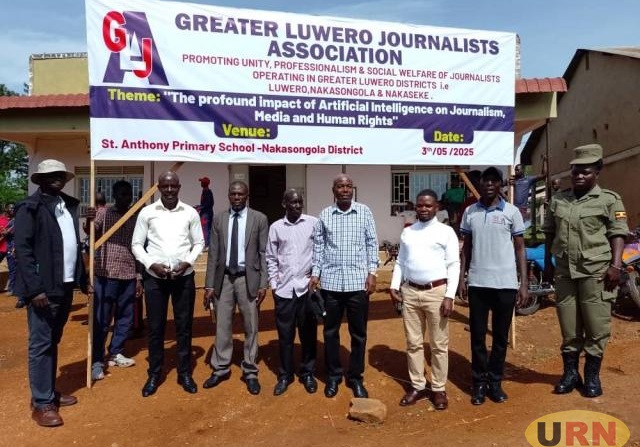
LUWERO, UGANDA | THE INDEPENDENT | Journalists have been urged to actively press the government for constructive dialogue as a key step toward finding lasting solutions to the persistent attacks against the media, many of which have involved brutal actions by security forces.
Speaking Saturday during the World Press Freedom Day celebrations organized by the Greater Luwero Journalists’ Association (GLJA) at St. Anthony Primary School in Nakasongola District, Minister for Public Service Wilson Muruli Mukasa advised the media to focus on promoting national unity rather than division.
“The press should be geared towards the unity of Uganda,” Mukasa said, emphasizing that the media must avoid tribalistic or sectarian reporting. He warned that the government tends to impose stricter measures when journalism appears to promote division, noting that irresponsible reporting often provokes crackdowns, including arrests that separate journalists from their families.
Mukasa encouraged journalists to advocate for dialogue with authorities, stressing that cooperation between the government and the media is achievable if both sides engage in meaningful discussions.
His comments were in response to grievances raised by journalists at the event. Herbert Kamoga, a correspondent with the Nation Media Group, decried the government’s victimization of certain media houses, particularly highlighting the restrictions imposed on NTV Uganda and the Daily Monitor in covering President Museveni.
He also cited similar experiences faced by Next Media outlets. Kamoga attributed these tensions to the media’s coverage of the recent Kawempe North by-election, where journalists suffered brutal attacks by security forces. In protest, journalists collectively boycotted coverage of security operations.
Expressing concern ahead of the 2026 general elections, Kamoga warned that without urgent intervention, violence against journalists could escalate even further. He called on Minister Mukasa to raise these issues with the relevant authorities to promote a healthier working environment for the media.
In a related development, celebrations in Nakasongola featured a procession led by the traffic police and a tree-planting exercise to address the adverse effects of climate change caused by rampant deforestation for charcoal production.
The theme for this year’s World Press Freedom Day was “The Profound Impact of Artificial Intelligence on Journalism, Media, and Human Rights.” Meanwhile, the lack of unity and an uncoordinated approach within the media industry were also cited as major hurdles to realizing true press freedom in Uganda. These concerns were raised during a separate World Press Freedom Day event organized by the Uganda Journalists Association (UJA).
Reflecting on progress and ongoing challenges, veteran journalist and press freedom advocate Richard Baguma lamented the persistent fragmentation among media practitioners. He noted that divisions have weakened the struggle for a liberated press, leaving journalists increasingly vulnerable to abuse. “The lack of unity and coordinated action has been here for many years,” Baguma said.
“There is a need to harmonize and implement well-thought-out, sustainable actions. No one is going to come from elsewhere and do it for you.” He pointed to failed initiatives such as establishing a health insurance scheme and a structured legal representation framework for journalists as evidence that internal reorganization is urgently needed.
Noeline Nassuuna from the Defenders Protection Initiative also emphasized the importance of preparedness as the country moves toward the 2026 elections. She urged UJA to go beyond lamenting over journalist assaults and to establish emergency response systems offering legal, medical, and psychological support.
Julius Mucunguzi, spokesperson for the Uganda Electoral Commission, stressed the media’s critical role in ensuring credible and transparent elections. He said attacks on journalists are direct assaults on the electoral process and democracy itself.
Mucunguzi acknowledged the brutality against journalists during the Kawempe North by-election but noted that the Electoral Commission alone cannot stop such incidents. He urged all stakeholders to share responsibility for creating a safe environment for credible elections.
He encouraged journalists to maintain professionalism by establishing facts, remaining objective, and acting independently to avoid accusations of bias during the upcoming elections.
Mucunguzi also cautioned against blacklisting agencies accused of brutalizing journalists, warning that such actions could encourage the rise of citizen journalists and distorted reporting. Instead, he advocated for open dialogue between media and security agencies to find common ground.
UJA president Mathias Rukundo revealed that the association has held several meetings with security agencies, encouraging them to direct any complaints against journalists to their employers, not treat them as criminal offenders. However, Rukundo warned that if journalists’ safety is not guaranteed, media practitioners might have no choice but to boycott coverage of the 2026 elections altogether.
*****
URN
 The Independent Uganda: You get the Truth we Pay the Price
The Independent Uganda: You get the Truth we Pay the Price





